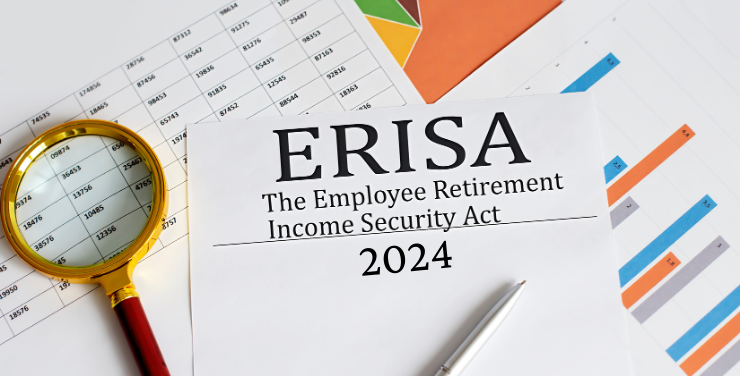2024 Retirement Plan Litigation Updates

Align takes its co-fiduciary status with its clients seriously. One way of demonstrating this commitment is staying informed of ERISA litigation to see what suits are being brought against plan sponsors, on what principles they’re being defended or lost, and how this can inform the processes and best practices we help you implement.
2023 Types of Excess Fee and Investment Imprudence Claims
In a Summary of 2023 Excess Fee & Performance Litigation report, Daniel Aronowitz, Managing Principal of Encore Fiduciary, provides the following breakdown of claims:
| 2023 Claim Type | # of Complaints |
|---|---|
| Excessive Recordkeeping Fees | 28 |
| Excessive Investment Fees | 17 |
| Deficient Investment Performance – Investment Imprudence | 23 |
| Wrong Share Class | 11 |
| High Fee / Underperformance of Active TDFs | 10 |
| Excess Float Income | 9 |
| Proprietary Funds | 7 |
| Forfeiture Claims | 5 |
| Stable Value Fund Claims | 4 |
| Excessive Managed Account Fees | 1 |
| Other (self-dealing) | 1 |
While these types of claims are not new, we see the courts and litigators continuing to wrestle over substantiating fiduciary breach claims, especially over investment performance and fees. In 2022 court rulings supported that poor performance with the benefit of hindsight alone was not enough to constitute a fiduciary breach. Similarly, excessive fee claims without proof of negligent process or comparison data based on “meaningful benchmarks” is likely still not enough to avoid dismissal. Simply making everything “cheap” is also no excuse from fiduciary duty. (Source: https://www.napa-net.org/news-info/daily-news/litigation-landscape-some-wins-some-losses-and-new-litigation-target-Litigation-Landscape-Some-Wins-Some-Losses-and-New-Litigation-Target, NAPA-net.org, Treichel, Bonnie, JD & Adams, Nevin E., JD).
Following similar rationale, Capital Group’s Senior Councilman, Jason Bortz, had this to say about the notable trend in Target Date Fund related litigation, “Collectively, this could mark a major shift in the theme of ERISA litigation, away from excessive fees to a focus on results. Expense ratios certainly still matter, but a more balanced approach that evaluates both fees and the net-of-fee results that ultimately determine retirement success may better serve participants and sponsors.”(Source: https://www.capitalgroup.com/advisor/insights/articles/tdf-litigation.html)
“ESG” Battle Continues
The filing of lawsuits by disgruntled employees claiming that ESG funds didn’t belong in their employers 401(k) Plan continue to increase while the discussion around the role and appropriateness of them continues, and the DOL continues to clarify its position. Per the DOL’s Prudence and Loyalty in Selecting Plan Investments and Exercising Shareholder Rights rule, which took effect on Jan. 30, 2023, “The Department has a longstanding position that ERISA fiduciaries may not sacrifice investment returns or assume greater investment risks as a means of promoting collateral social policy goals.” (https://www.govinfo.gov/content/pkg/FR-2022-12-01/pdf/2022-25783.pdf)
As it often goes, the issue got politicized when the 2020 Trump administration levied their influence over the matter, and the Biden administration subsequently pushed back when it took office. Yet, as U.S. District Judge Matthew J. Kacsmaryk explained, “the 2022 Rule changes little in substance from the 2020 Rule and other rulemakings.” (https://www.napa-net.org/news-info/daily-news/federal-court-backs-dol-esg-rule-suit-red-state-ags)
The bottom line is that ESG-labeled investments are not an automatic “no-go” in a retirement plan lineup but adding them must be approached judiciously. Discretion remains with the plan fiduciaries with the guidance that ESG factors should neither be ascribed greater value than normal investment evaluation criteria, nor precluded from the conversation.
“Honorable mentions” – Other Topics in Pending Lawsuits
- Use of Forfeiture dollars: make sure you only use it on plan expenses approved by the plan document (https://www.napa-net.org/news-info/daily-news/litigation-landscape, Nevin Adams, JD.)
- Cybersecurity/cybertheft: make sure your service providers can demonstrate proficiency and up-to-date controls/processes.
- Stable Value Fund selection: all SVF’s are not created equal, do your due diligence, document your process.
- Participant Data: participant data isn’t considered a “plan asset” owned by the Plan, and can and should be shared with recordkeepers, BUT understanding what your recordkeeper’s contract says they can do with participant data is advised.
Summary: ERISA remains a law of prudent process.
Align helps support you in fulfilling your fiduciary duties to have prudent and documented processes.
- Providing ongoing monitoring of investment fund performance and fees in accordance with an Investment Policy Statement that is developed considering your Plan goals and participant demographics.
- Providing disciplined decision-making guidance on fund selection, including ESG consideration and Stable Value Funds, based on a behaviorally informed approach to investing, risk adjusted returns and other prudent metrics, as opposed to a demonstrably unsupported approach of chasing performance alone.
- Prudently benchmarking your Plans recordkeeper fees in light of services provided by utilizing a combination of widely respected benchmarking software AND periodic proposals from competitor service providers.
- Reviewing cybersecurity policies and protections of our recommended vendors as well as our own.
- Enlisting the professional support of Plan Administrators to monitor forfeiture account balances and their allowable utilization per the legal Plan Document.
